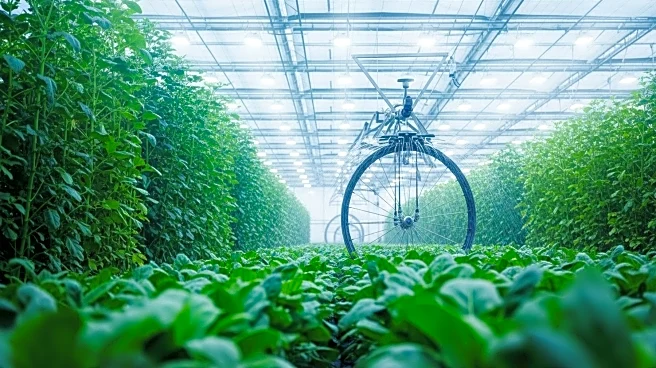What is the story about?
What's Happening?
Dr. Tahira Pirzada, CEO of Soteria Formulations and a research scholar at North Carolina State University, is leading efforts to redefine agricultural input delivery through innovative technologies. Originally working on a Gates Foundation-funded project, Pirzada developed biodegradable seed wraps from agricultural residues, significantly improving yam yields in Benin and reducing pesticide use by up to 90%. This success led to the founding of Soteria Formulations, which focuses on creating seed coatings and pelleted granules that enhance the performance of chemical and biological products. The company aims to reduce off-target chemical loss, improve input efficiency, and support sustainable crop protection. Soteria Formulations is part of NC State's Seed2Grow entrepreneurial program, which aids plant science startups in advancing research toward commercialization.
Why It's Important?
The work of Soteria Formulations is crucial in addressing global agricultural challenges such as pest resistance, chemical residues, and environmental impact. With an estimated 20-40% of crops lost to pests and up to 90% of agrochemicals failing to reach their target, Soteria's technology offers a solution by reducing the number of applications needed, thereby curbing contamination and improving food safety. The company's innovations have the potential to transform agriculture by providing more efficient and sustainable solutions that benefit farmers, consumers, and the environment. This approach not only supports smallholder farmers in Africa but also has implications for large-scale agriculture in North America and Europe.
What's Next?
Soteria Formulations is advancing its NexGran™ pelleted formulation with manufacturing partners and developing specialized seed coatings. The company is focused on product validation, scaling, and forming industry partnerships to facilitate wider adoption of its technologies. Support from NC State, NCBiotech, and industry advisers is guiding the startup through technology transfer, market readiness, and global strategy. As Soteria sets its sights on transforming agriculture at scale, it aims to provide solutions that are efficient and sustainable, addressing the needs of farmers worldwide.
Beyond the Headlines
The ethical and environmental dimensions of Soteria Formulations' work are significant. By reducing chemical use and improving crop yields, the company is contributing to a more sustainable agricultural model that prioritizes environmental health and food safety. This approach aligns with global efforts to reduce the ecological footprint of agriculture and promote sustainable practices. The company's success in Africa and its expansion into global markets highlight the potential for innovative agricultural technologies to drive positive change across diverse farming contexts.

















